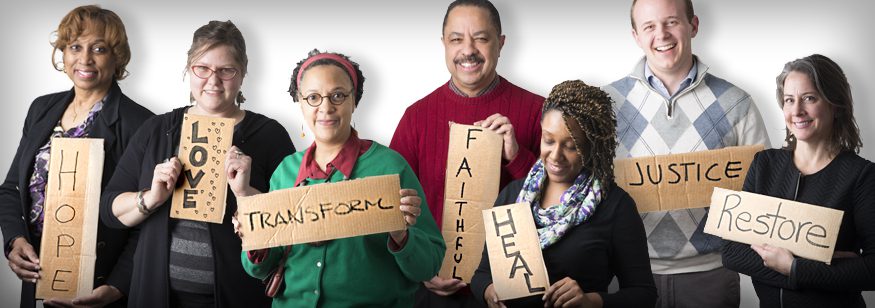Editor’s note: Bread Blog is running a year-long series exploring passages from The Poverty & Justice Bible published by the American Bible Society (Contemporary English Version). The intent is a theological exploration at the intersection of social justice and religion. The blog posts will be written by members of the church relations staff at Bread for the World.
“Whoever is the greatest should be the servant of the others. If you put yourself above others, you will be put down. But if you humble yourself, you will be honored.” (Matthew 23:11-12)
By Diane Ford Dessables
A marvelous book authored by Brian D. McLaren entitled, “We Make the Road by Walking,” offers a reflection on Matthew 23:11-12. This text invites Christians to live into the ways in which the Holy Spirit turns our obsession with upward mobility upside down.
McLaren suggests that “we quest for a higher standard of living, professional promotion or social status. However, by the movement of the Spirit we are led downwards to a place of humility” and a position and posture of service in alliance with the underserved. When yielded to, the Spirit draws us to be among persons in need. We begin to walk with folks in back alleyways of impoverished communities, at the border with families being torn apart there, beside homeless queers who have been beaten and battered, in the shoes of the mentally ill, with those impoverished on Native lands, or among those detained and incarcerated.
Jesus modeled this for us by coming to earth to meet us on our level.
Ministry is the bridge that connects the so-called outsider to those who privilege themselves as America’s insiders. By functioning as a bridge, “you may well find that corporate, economic, and political structures often exalt messages, build systems, and promote policies that spread false information about those who buck the trend to accumulate more power, wealth, and control,” McLaren observes.
You likely will witness the vilification of people or groups who are blamed for a collective anxiety that hovers over those who thirst for advancement over others. Addicted people of all stripes cause harm to themselves and others, alike – the reason you may well risk your reputation defending those who are being scapegoated.
But increasingly, “those of us that follow the Holy Spirit’s invitation see the person who by their dress, language, culture, orientation, race, class, or beliefs are cast aside. We come to know them as our own need for spiritual restoration is met,” McLaren concludes. And we are drawn to serve by following, listening, and learning from them. This may frighten us. It challenges us. But as we let the Spirit guide us, our simple act of humility provides us with great joy.
Bread for the World’s advocacy among immigrant populations who seek relief from economic exploitation invites us to follow the Spirit in this way. We follow as we stand against denigration that is masqueraded through xenophobia. We listen and learn from prison returnees who are stripped of their right to vote as we strive with them to restore benefits afforded to most. We are spiritually restored by walking among impoverished women who fight for equal pay and food for the nourishment of their hungry children.
The underserved offer the fruits of the Spirit that we who are privileged desperately need in order for our spiritual poverty and hunger to be realigned with Christ and for those who are marginalized to be fully satisfied.
Diane Ford Dessables is senior associate for denominational relations at Bread for the World



